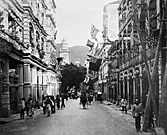HONG KONG'S HISTORY (PART II)

THE OPIUM WARS AND THEIR AFTERMATH
The coming of the British marks the territory's emergence in world affairs. In the early 19th Century British traders were making a fortune in the opium trade, exchanging the infamous commodity for China's silver, silk, tea and spices. Eventually the Chin
ese Imperial Government, worried about the drug's effects on its population, sought to ban the import of opium. Britain, on the other hand, wanted to strengthen its foothold with its own port, free of Imperial control.
This led to the Opium Wars (1840-1842). Queen Victoria's gunboats prevailed, and Hong Kong Island was ceded to Britain in perpetuity under the Treaty of Nanking in 1842.
THE 20TH CENTURY: FROM STRENGTH TO STRENGTH
 Hong Kong's cityscape soon reflected its status as an important trading port: the Peak Tram funicular railway was built in 1885, followed by a new tramway systemin 1904 and a new railway to Canton six years later.
Hong Kong's cityscape soon reflected its status as an important trading port: the Peak Tram funicular railway was built in 1885, followed by a new tramway systemin 1904 and a new railway to Canton six years later.
In the 1950s Hong Kong began in earnest a new career as a manufacturing and industrial centre. Textiles, electronics, watches, and many other low-priced goods stamped "Made in Hong Kong" flowed from the territory in ever-increasing
amounts.
 Go back to previous page
Go back to previous page

 Go back to previous page
Go back to previous page
 Hong Kong's cityscape soon reflected its status as an important trading port: the Peak Tram funicular railway was built in 1885, followed by a new tramway systemin 1904 and a new railway to Canton six years later.
Hong Kong's cityscape soon reflected its status as an important trading port: the Peak Tram funicular railway was built in 1885, followed by a new tramway systemin 1904 and a new railway to Canton six years later.
 Go to University of Windsor
Go to University of Windsor Go back to the top
Go back to the top